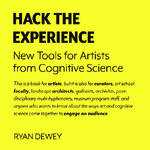Hack the Experience: Tools for Artists from Cognitive Science
Author(s)
Dewey, Ryan
Collection
ScholarLedLanguage
EnglishAbstract
Hack The Experience will reframe your perspective on how your audience engages your work. This will happen as you learn how to control attention through spatial and time-based techniques that you can harness as you build immersive installations or as you think about how to best arrange your work in an exhibition. You’ll learn things about the senses and how they interface with attention so that you can build in visceral forms of interactivity, engage people’s empathetic responses, and frame their moods. This book is a dense bouillon-cube of techniques that you can adapt and apply to your personal practice, and it’s a book that will walk you step-by-step through skill sets from ethnography, cognitive science, and multi-modal metaphors. The core argument of this book is that art is a form of cognitive engineering and that the physical environment (or objects in the physical environment) can be shaped to maximize emotional and sensory experience. Many types of art will benefit from this handbook (because cognition is pervasive in our experience of art), but it is particularly relevant to immersive experiential works such as installations, participatory/interactive environments, performance art, curatorial practice, architecture and landscape architecture, complex durational works, and works requiring new models of documentation. These types of work benefit from the empirical findings of cognitive science because intentionally leveraging basic human cognition in artworks can give participants new ways of seeing the world that are cognitively relevant. This leveraging process provides a new layer in the construction of conceptually grounded works.
Keywords
curatorial studies; cognitive science; sensory engineering; museum studies; design theoryDOI
10.21983/P3.0206.1.00ISBN
9781947447660, 9781947447653OCN
1100489579Publisher
punctum booksPublisher website
https://punctumbooks.com/Publication date and place
Brooklyn, NY, 2018Classification
Museology and heritage studies


 Download
Download